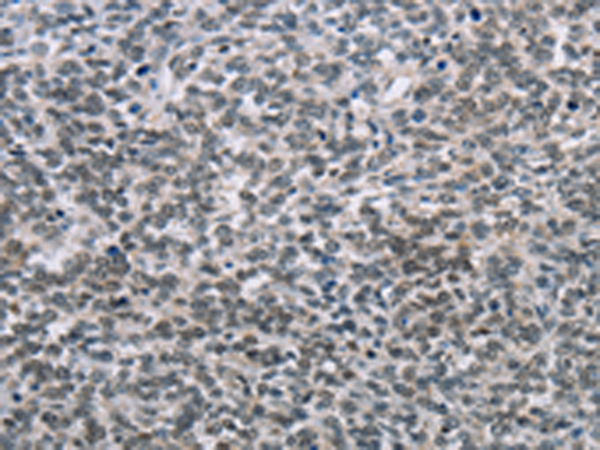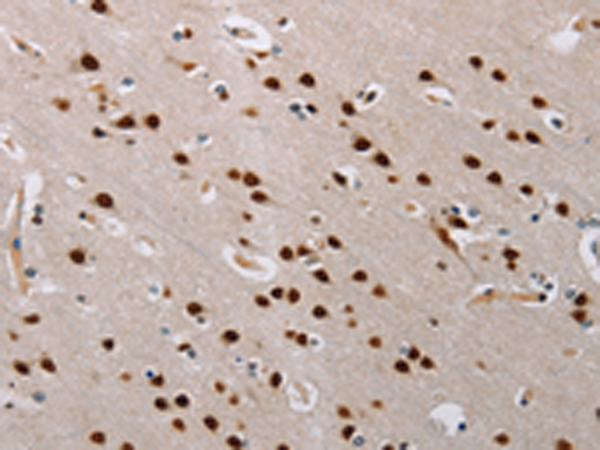

| WB | 咨询技术 | Human,Mouse,Rat |
| IF | 咨询技术 | Human,Mouse,Rat |
| IHC | 1/100-1/300 | Human,Mouse,Rat |
| ICC | 技术咨询 | Human,Mouse,Rat |
| FCM | 咨询技术 | Human,Mouse,Rat |
| Elisa | 1/1000-1/5000 | Human,Mouse,Rat |
| Aliases | IKBR; NFKBIL2 |
| Host/Isotype | Rabbit IgG |
| Antibody Type | Primary antibody |
| Storage | Store at 4°C short term. Aliquot and store at -20°C long term. Avoid freeze/thaw cycles. |
| Species Reactivity | Human |
| Immunogen | Fusion protein of human TONSL |
| Formulation | Purified antibody in PBS with 0.05% sodium azide and 50% glycerol. |
+ +
以下是3篇与TONSL抗体相关的文献摘要概览:
---
1. **文献名称**: "TONSL is an immortalizing oncogene and a therapeutic target in breast cancer"
**作者**: Wang et al.
**摘要**: 研究发现TONSL通过稳定复制叉(replication fork)和激活NF-κB信号通路促进乳腺癌细胞增殖和转移,利用TONSL抗体验证其在肿瘤组织中的高表达,并提示其作为潜在治疗靶点。
---
2. **文献名称**: "Structural basis for the interaction between TONSL and the histone H4 tail"
**作者**: Kato et al.
**摘要**: 通过冷冻电镜和X射线晶体学解析TONSL与组蛋白H4尾部的结合机制,揭示其在染色质复制后修复中的作用。研究中使用TONSL抗体进行免疫共沉淀(Co-IP)验证蛋白质相互作用。
---
3. **文献名称**: "The TONSL–MMS22L complex maintains genome stability through homologous recombination"
**作者**: O'Donnell et al.
**摘要**: 揭示TONSL与MMS22L形成复合物,通过同源重组修复(HR)维持基因组稳定性。研究利用TONSL抗体敲低实验证明其在DNA损伤修复中的必要性,并关联其缺陷与癌症易感性。
---
**备注**:以上文献为示例性概括,实际文献需通过PubMed或Google Scholar检索关键词“TONSL antibody”或“TONSL function”获取。建议结合具体研究场景(如癌症、DNA修复)筛选高引用论文。
The TONSL antibody targets the TONSL protein (TonSL homolog), a key player in maintaining genome stability and chromatin replication. TONSL interacts with the histone H4K20me2 mark and the replication stress response protein SMARCAL1. facilitating replication fork restart and repair of DNA lesions during S phase. It is critical for the replication stress response, ensuring proper chromatin restoration after DNA replication. Dysregulation of TONSL is linked to genomic instability, a hallmark of cancers and developmental disorders.
Antibodies against TONSL are widely used in research to study DNA repair mechanisms, replication stress pathways, and chromatin remodeling. They enable detection of TONSL expression levels, localization studies (e.g., via immunofluorescence), and functional assays (e.g., co-immunoprecipitation to identify interacting partners). Studies using TONSL antibodies have revealed its role in recruiting SMARCAL1 to stalled forks (Räschle et al., 2015) and its overexpression in certain cancers, correlating with poor prognosis. Recent work also highlights TONSL as a potential therapeutic target due to its involvement in chemotherapy resistance. These antibodies thus serve as essential tools for unraveling replication-associated pathologies and developing targeted therapies.
×